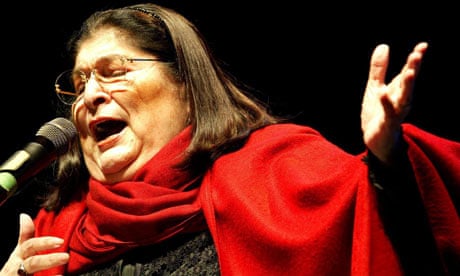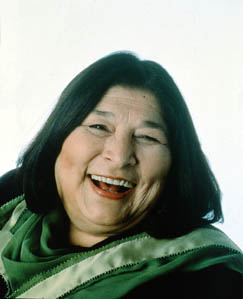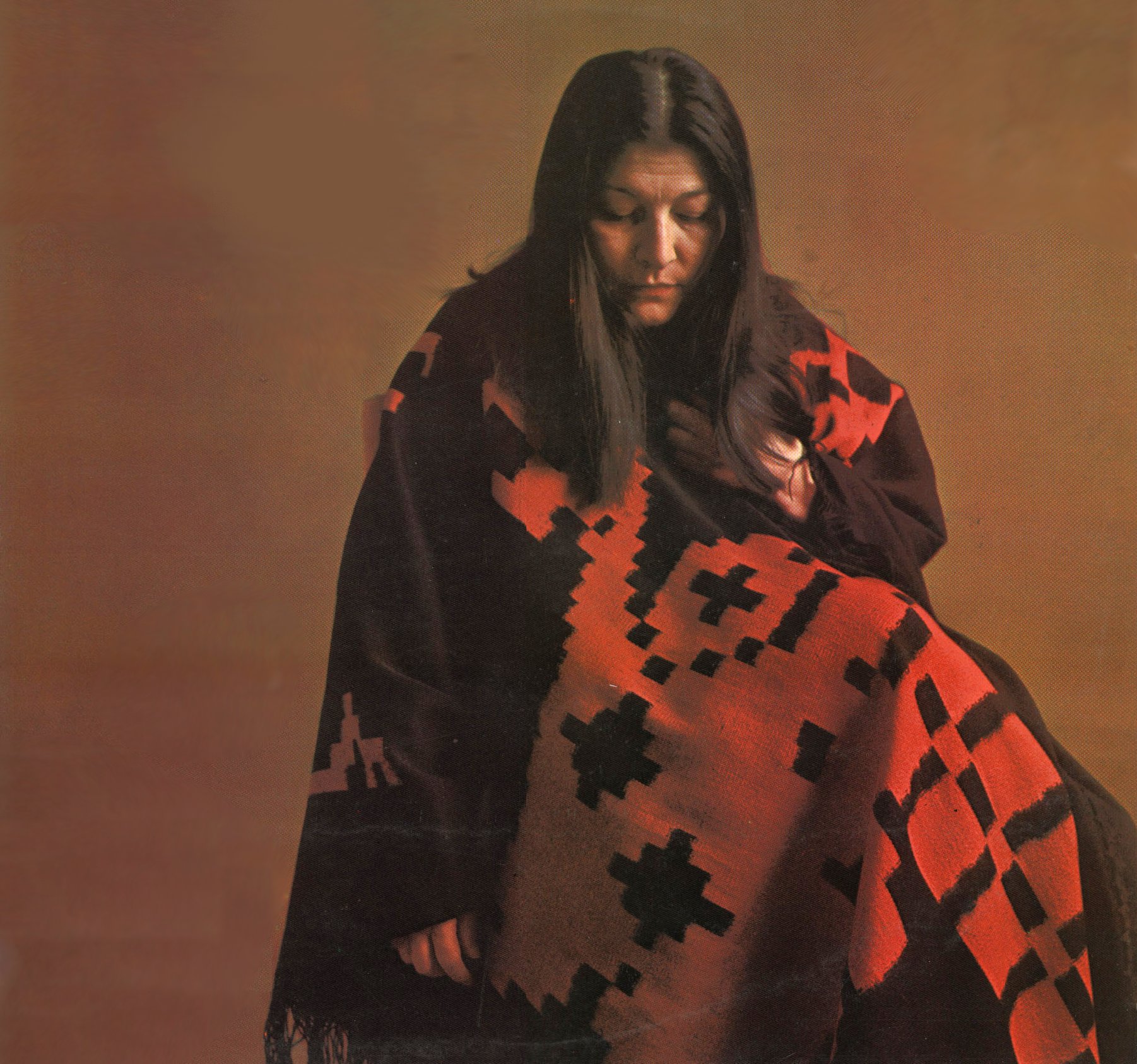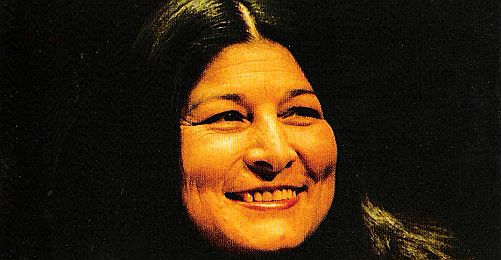Mercedes Sosa
Mercedes Sosa

Haydée Mercedes Sosa, known affectionately as La Negra, was an iconic Argentine singer born on July 9, 1935, and passed away on October 4, 2009. Renowned for her powerful voice and deep connection to Argentine folk music, Sosa became one of the leading figures of El nuevo cancionero, a movement that revitalized Latin American folk music.
Throughout her career, Sosa gave voice to the songs of numerous Latin American songwriters, earning her the title of "the voice of the voiceless ones" and "the conscience of Latin America." Her music resonated not only in Argentina but also across Latin America and beyond, making her a beloved figure in the region and around the world.
Sosa's performances took her to prestigious venues worldwide, including the Lincoln Center in New York City, the Théâtre Mogador in Paris, and even the historic Sistine Chapel in Vatican City. She captivated audiences with sell-out shows at renowned venues like Carnegie Hall in New York and the Roman Colosseum during the final decade of her life.
Throughout her illustrious career spanning four decades, Sosa received numerous accolades, including six Latin Grammy awards. In 2004, she was honored with a Latin Grammy Lifetime Achievement Award, recognizing her immense contribution to Latin American music. Even after her passing, Sosa's legacy endured, with posthumous awards recognizing her outstanding contributions to folk music in 2009 and 2011.
In addition to her musical achievements, Sosa served as a dedicated ambassador for UNICEF, using her platform to advocate for the rights and well-being of children around the world.
Haydée Mercedes Sosa's enduring impact on Latin American music and culture continues to be felt, cementing her status as one of the most influential and beloved figures in the history of Argentine and Latin American music.
Haydée Mercedes Sosa was born on July 9, 1935, in San Miguel de Tucumán, located in the northwestern Argentine province of Tucumán. She was born into a family of mestizo ancestry, with roots tracing back to French, Spanish, and Diaguita descent. Her parents, who worked as a day laborer and a washerwoman, held Peronist beliefs, although they were not officially registered with the party.
Sosa's journey into the world of music began at a young age, influenced by her upbringing and surroundings. She started her singing career for the Peronist Party in Tucumán under the name Gladys Osorio, reflecting her early engagement with political and social themes through music.
At the age of fifteen, Sosa's talent was recognized when she won a singing competition organized by a local radio station in 1950. This victory earned her a contract to perform for two months, marking the beginning of her musical career. In 1959, she recorded her first album titled "La Voz de la Zafra," marking the initial steps of what would become a legendary musical journey.
Sosa's breakthrough moment came during the 1965 Cosquín National Folklore Festival. Fellow folk singer Jorge Cafrune introduced her to the stage, bringing her to the attention of the Argentine public and setting the stage for her rise to prominence in the Latin American music scene.
From these early beginnings, Haydée Mercedes Sosa embarked on a remarkable musical career that spanned decades, earning her acclaim and admiration both in Argentina and across Latin America. Her contributions to folk music and her advocacy for social justice and cultural preservation left an indelible mark on the cultural landscape of Argentina and beyond.
Haydée Mercedes Sosa and her first husband, Manuel Oscar Matus, were influential figures in the mid-60s nueva canción movement, known as nuevo cancionero in Argentina. This movement sought to infuse folk music with social and political themes, reflecting the realities of life in Latin America. Sosa and Matus, who had one son together, played pivotal roles in championing this musical and ideological movement.
Sosa's early career included the release of her second record, "Canciones con Fundamento," which featured a collection of traditional Argentine folk songs. In 1967, she embarked on a successful tour of the United States and Europe, expanding her reach and earning international acclaim for her soulful performances.
As her career progressed, Sosa continued to evolve as an artist, exploring a diverse range of musical styles and themes. In the early 1970s, she collaborated with composer Ariel Ramírez and lyricist Félix Luna on two concept albums: "Cantata Sudamericana" and "Mujeres Argentinas" (Argentine Women). These albums showcased Sosa's ability to interpret and breathe life into compositions that celebrated the rich cultural heritage of South America.
In 1971, Sosa paid tribute to Chilean musician Violeta Parra with a poignant rendition of "Gracias a la vida," a song that would become one of her signature pieces. Throughout her career, she also popularized songs by renowned artists such as Milton Nascimento of Brazil, as well as Pablo Milanés and Silvio Rodríguez from Cuba.
Through her music, Haydée Mercedes Sosa not only entertained audiences but also served as a voice for the voiceless, advocating for social justice and cultural expression across Latin America. Her legacy as one of the most influential figures in Latin American music continues to resonate with audiences worldwide.
References
- Mercedes Sosa at BrainyHistory.com
- ^ "Singer Mercedes Sosa: The voice of the 'voiceless ones' outlasts South American dictatorships".
- ^ Heckman, Don (29 October 1995). "POP MUSIC : The Voice Heard Round the World : Mercedes Sosa, a compelling figure in world music and a social activist, will make a rare L.A. appearance". Los Angeles Times. Retrieved 5 December 2023.
- a b c d e f g h "Legendary folk singer Mercedes Sosa dies at 74". France 24. 4 October 2009. Retrieved 5 October 2009.
- ^ Heckman, Don (29 October 1995). "POP MUSIC : The Voice Heard Round the World : Mercedes Sosa, a compelling figure in world music and a social activist, will make a rare L.A. appearance". Los Angeles Times. Retrieved 5 December 2023.
- ^ Mercedes Sosa: The Voice of Latin America. Dir. Rodrigo H. Villa. First Run Features, 2013. Web.
- a b c d e f g h "Mercedes Sosa: Obituary". The Daily Telegraph. 4 October 2009. Retrieved 5 October 2009.
























